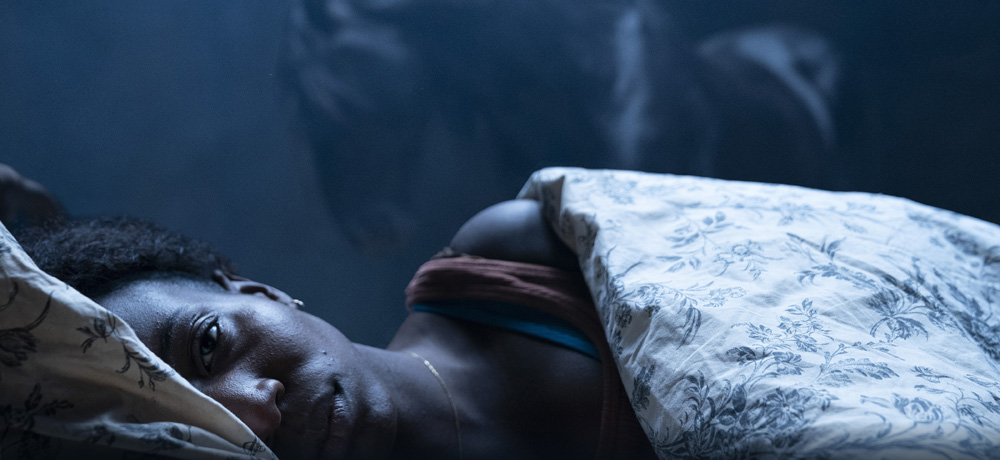






Kindred can be classified as one of those films that leaves you confused as to whether or not you hated it or liked it. It’s much harder to lean into the latter because it’s absolutely maddening. Not because it’s an awful film—it’s not—but because of what the central character goes through. Joe Marcantonio’s feature debut is a psychological thriller that takes psychotic to the max and the thrill to palm-sweaty stress. It’s narratively ambiguous with ideas and themes that are familiar, but it’s held in a tight grip by forceful performances.
The film introduces an interracial couple, Charlotte (Tamara Lawrance) and Ben (Edward Holcroft), as they break the news to Ben’s mother, Margaret (Fiona Shaw), that they want to leave Britain and move to Australia. Margaret is sickened at the idea, going off about Ben needing to stay for his family, his responsibilities, and he can’t just leave when nine generations have lived in the same home, in the same place. It leans on the fact that the older generations in old, wealthy (English) families abhor change, modernity, and fear broken tradition. But in this grand house, impeccably designed by Derek Wallace, there’s a bird stuck in a cage. Some overused symbolism, yes, but this cage is a dollhouse. And when there’s a dollhouse, you know shit’s gonna go down.
The first sign that something ominous is on the rise is the fact that crows seem to follow Charlotte everywhere. Pecking at windows and greeting her with a ghastly shriek. Then, she finds out she’s pregnant, and it’s more of a shock and a fright to her than most people would experience because of a malady her mother suffered from during and after pregnancy. So, naturally, she’s not as enthusiastic about the pregnancy as Ben, and she even says she doesn’t want the baby.
When Ben is involved in a shocking accident while on the job, she finds herself alone, in a big house, with her boyfriend’s overbearing mother and controlling stepbrother, Thomas (Jack Lowden). It wouldn’t be a surprise to learn that Kindred is inspired by Edgar Allan Poe’s “The Raven,” the tale of a talking raven who visits a distraught lover and watches him fall into madness. In Ben’s absence, Charlotte begins to have dreams and visions about crows and horses—alluring and accompanied by a surprisingly calming score—that become more vivid as the film goes on. In art and literature, horses and crows are depicted as harbingers of bad luck and death. Certainly, some form of foreshadowing, as those kindred ties are bound so tightly around Charlotte and her unborn baby. Margaret insists she stay with her, and she and Thomas make any excuse, any lie to keep her there in a permanent, twisted way. She’s told to comply for her sake and the health of her baby. What’s a mother to do?
Kindred is interesting because it can be interpreted in several ways. Charlotte’s dizzy spells, confusion, and hallucinations can all be due to her pregnancy, as they are all symptoms of perinatal psychosis, her mother’s illness that’s alluded to throughout the film and finally named in the last 30 minutes or so. This is the reason why she took the pregnancy news with apprehension—a fear of showing signs of generational illness or passing them down. But Margaret and Thomas may also be using her family history to gaslight her, making her think she’s suffering the same illness when she’s really not. The control they have on her is distressing to witness and emphasized by a score that becomes shriller as her situation evolves into one more dire and stressful.
All of these things could not be felt if it weren’t for the performances. Lawrance goes through a rollercoaster of emotions and conveys them all effectively. Lowden’s performance is more subtle, with his intentions conveyed through his facial expressions. He always looks like he’s hiding something, trying to hold back his psychotic nature. And Fiona Shaw? Absolutely frightening. She has angry outbursts that take you by surprise every time, especially if you’re a fan of hers from Killing Eve and are used to seeing her as a more calm and formidable character. It’s also strange seeing an actress of often strong composure having to act in a more debilitated state. (Her Oscar? Where is it?)
Kindred, while tainted by some plot holes and a frustrating premise, is tense and thought-provoking. Bound to be divisive, it will certainly generate good conversation from the Black community as Charlotte feels like a representation of Black women, especially Black mothers, who are often unprotected by institutions that are supposed to help them and people who are supposed to support them.
Movie Score: 3/5